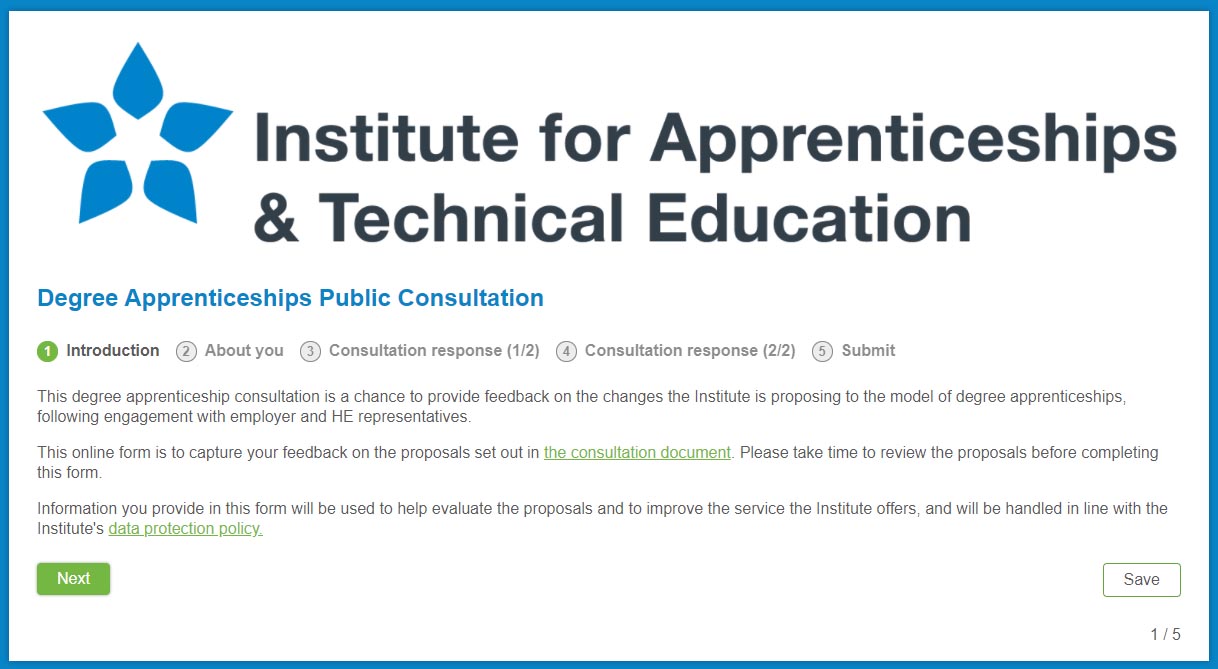Is it the end of Degree Apprenticeships for the Professions?

The Government’s Institute of Apprenticeships and Technical Education (@IFATEched) is in the midst of a consultation, due to end on the 16th of this month (September), on the future shape of degree and post-graduate apprenticeships.
The consultation sets out proposals for changes in five key aspects of degree and post-graduate apprenticeships, namely:
5 Key Proposals
1. The currency of degrees
Firstly, they propose to amend mandatory qualifications policy to recognise the currency of degrees, including where there are no specific subject discipline requirements for entry to an occupation.
As part of this they will mandate degrees in apprenticeship standards that will be occupationally specific, only in the case of graduate-entry occupations at level 6 and level 7.
2. Full on-the-job integration
Secondly, degrees within a degree apprenticeship will fully integrate with the on-the-job training and development that apprentices experience.
3. Aligning degrees to apprenticeship standards
Thirdly, in support of proposed second change the Institute will require that the learning outcomes of any degree mandated in an apprenticeship standard will reflect the requirements of the occupation through alignment with the knowledge, skills and behaviours (KSBs) in the employer-specified occupational standard.
This will necessitate Higher Education Institutions (HEIs) to develop and validate degrees specifically aligned to the apprenticeship standard, noting that this may already be the case for some regulated occupations.
4. End-point assessment as final degree assessment
Fourthly, the Institute will only approve degree apprenticeships where the end-point assessment (EPA) of occupational competence in a degree apprenticeship will integrate with the final assessment of the degree.
The objective is to ensure that neither the degree nor the apprenticeship can be awarded in isolation from the other, with the EPA serving both.
5. Occupational specific assessment
Finally, the Institute will require the integrated EPA of all degree apprenticeships to include assessment by trained individuals with appropriate occupational and industry expertise.
In line with existing good practice in many HEIs, this will assist with securing the occupational specificity of assessment by addressing the conflicts inherent in integrated degree apprenticeship assessment and drawing in an occupational perspective.
The Institute’s degree apprenticeship proposals put the opportunity to improve the training of professionals in the bin!
The first and second of these are not particularly controversial; in fact, subject to seeing the detail they appear sensible.
However, the third, fourth and fifth, taken together will result in universities signing off, without independent scrutiny, professional occupations critical to the economy.
This without the full engagement of the employers in the sector or the relevant professional bodies.
Whilst this may work in the NHS where there are University Hospitals it does not work in sectors that do not have these types of facilities available to them. We do not for example have University Contractors who build power stations or University Banks that run retail or investment banking.
In all professions there are well trodden decades old paths to full chartered membership of a professional body. The EPA process, even before the proposed changes, does not fit well with professional body accreditation. The latest Institute proposals make them completely unworkable.
To become a full competent qualified person in all the various professional sectors an individual must have achieved the appropriate academic level of knowledge, that is a level 6 degree or post-graduate degree at level 7. In addition, they must have completed a substantial period, typically 3 to 4 years, in employment as in effect a ‘trainee’ professional.
The Institute’s proposals relegate this crucial on-the-job component to something more like the work placement they have embedded in the level 3 T-Levels. Their proposals for degree and post-graduate degree apprenticeships completely misunderstand the importance and scope of on-the-learning necessary in the 3 to 4 years of training and skill development in the workplace.
When the degree apprenticeship policy came about, I felt it was a real opportunity to improve the training of professionals; having been through the process myself to become both a chartered civil engineer and certified management consultant.
It looked as if there could be a more dynamic delivery which would enhance the experience for the apprentice and their employer; with the possibility of shortening the duration.
The Institute’s proposals in effect put that hope and opportunity in the bin!
So, if someone is wanting to enter the professions, these people will need to consider the alternatives as the degree apprenticeship route may not open the door to a professional career.
What a lost opportunity!
Graham Hasting-Evans, NOCN Group Chief Executive
|
A spokesperson for the Institute for Apprenticeships and Technical Education said: “We are committed to working with everyone to improve degree apprenticeships, and welcome different perspectives. “That is precisely why we are running a consultation on the topic. “No decisions have been made and we would encourage everyone with an interest to respond before 16 September.” |
 |











Responses